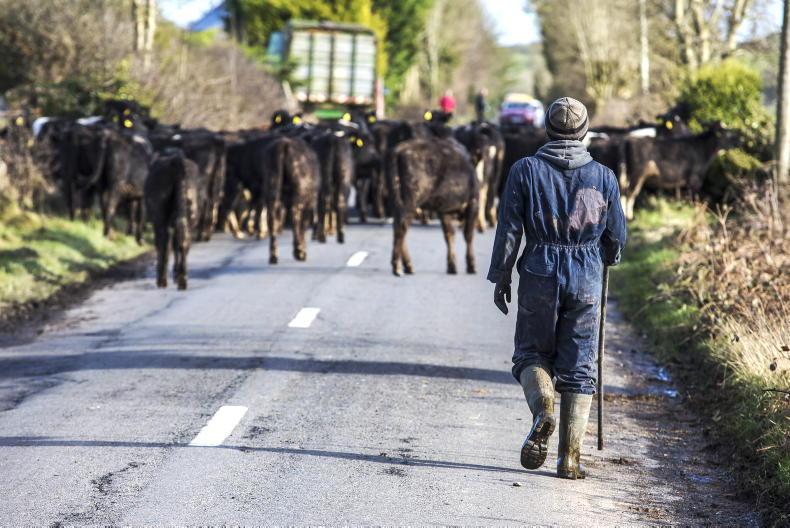Ensuring that policies change to give farmers a menu of profitable land use options to choose from will be key to reducing the farming sector’s emissions, according to one of the authors of a major climate change assessment report.
These options could include forestry, lower stocking rates and reduced input use, but critically, they must provide sufficient farmer incomes if they are to be taken up, senior lecturer in environmental science at UCC Dr Paul Deane told the Irish Farmers Journal.
Deane explained that there are two central elements in Ireland’s greenhouse gas emissions profile; a dependency on fossil fuels which must be cut to zero and a heavy reliance on farming.
Emissions
On farming’s emissions, he explained that “they don’t need to go to zero, but they do need to reduce significantly.”
“And when we think about farming, it’s very important to realise that it is not people who are the problem, it’s the policies that they have to follow that really need to change.
“We need policies in Ireland that allow farmers to produce really good food, which we do already, but also to protect the environment.
“Because at the moment, the policy, particularly around high-input agriculture or the intensification of agriculture, is forcing many families to choose between making a living and protecting the environment.
“We need policies to change to make sure we have farmers who can do both of those things.”
The researcher stated that farming in Ireland and other European countries operates within policies “which demand farmers overwork their land” and “overburden the environment” but still get underpaid. “It’s not fair, it’s not good for farmers and it’s not good for society,” he said.
‘Less livestock’
Deane pointed to what he said are unavoidable facts of the move towards a lower emissions farming sector.
This includes fewer livestock, but again, he emphasised that reducing numbers should be incentivised with more profitable options for farmers to pick for farming the land.
“Some of the hard facts that we have to face, we are going to have to realise that we do need to have less livestock in Ireland, but not less farmers,” he said.
“Farmers are the custodians of the land. What we really need to do is offer communities more ways of using the land, but first and foremost, it has to be financially viable and profitable.
“The choices need to come from agriculture itself, it’s not academics telling farmers what they need to do.
“There must be a menu of options but it must be financially logical and environmentally sustainable, as well.”
On the impacts of climate change on agriculture, the researcher added that Ireland could be left more exposed to extremes of climate, given the realities of operating grass-based production systems.
Read more
Cutting national herd ‘likely to be necessary’ for climate - new report
Diversification ‘key’ to farming’s share of emissions cuts - Minister Ryan
Ensuring that policies change to give farmers a menu of profitable land use options to choose from will be key to reducing the farming sector’s emissions, according to one of the authors of a major climate change assessment report.
These options could include forestry, lower stocking rates and reduced input use, but critically, they must provide sufficient farmer incomes if they are to be taken up, senior lecturer in environmental science at UCC Dr Paul Deane told the Irish Farmers Journal.
Deane explained that there are two central elements in Ireland’s greenhouse gas emissions profile; a dependency on fossil fuels which must be cut to zero and a heavy reliance on farming.
Emissions
On farming’s emissions, he explained that “they don’t need to go to zero, but they do need to reduce significantly.”
“And when we think about farming, it’s very important to realise that it is not people who are the problem, it’s the policies that they have to follow that really need to change.
“We need policies in Ireland that allow farmers to produce really good food, which we do already, but also to protect the environment.
“Because at the moment, the policy, particularly around high-input agriculture or the intensification of agriculture, is forcing many families to choose between making a living and protecting the environment.
“We need policies to change to make sure we have farmers who can do both of those things.”
The researcher stated that farming in Ireland and other European countries operates within policies “which demand farmers overwork their land” and “overburden the environment” but still get underpaid. “It’s not fair, it’s not good for farmers and it’s not good for society,” he said.
‘Less livestock’
Deane pointed to what he said are unavoidable facts of the move towards a lower emissions farming sector.
This includes fewer livestock, but again, he emphasised that reducing numbers should be incentivised with more profitable options for farmers to pick for farming the land.
“Some of the hard facts that we have to face, we are going to have to realise that we do need to have less livestock in Ireland, but not less farmers,” he said.
“Farmers are the custodians of the land. What we really need to do is offer communities more ways of using the land, but first and foremost, it has to be financially viable and profitable.
“The choices need to come from agriculture itself, it’s not academics telling farmers what they need to do.
“There must be a menu of options but it must be financially logical and environmentally sustainable, as well.”
On the impacts of climate change on agriculture, the researcher added that Ireland could be left more exposed to extremes of climate, given the realities of operating grass-based production systems.
Read more
Cutting national herd ‘likely to be necessary’ for climate - new report
Diversification ‘key’ to farming’s share of emissions cuts - Minister Ryan






 This is a subscriber-only article
This is a subscriber-only article









SHARING OPTIONS: